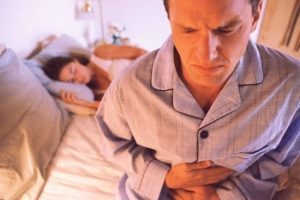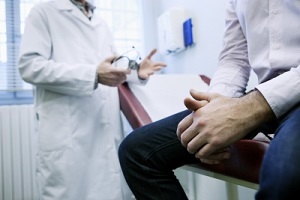
Prostate Inflammation> is a disease that mainly affects men between the ages of twenty to fifty-five years. The older a man is, the greater the risk of prostatitis.
With early prostatitis, glandular function is activated. Along with the onset of inflammation, tissue regeneration occurs.
Let's talk in more detail about the first signs of prostatitis in men and treatment.
How to recognize?
The onset of prostatitis is rarely clearly identified, as sometimes it is not symptomatic, and the symptoms are individual to each patient and change over time.
These features include:
- A man has some difficulty urinating in the toilet. The glands gradually enlarge, the urinary tract contracting.
- Patients lose interest in sex. The difficulty of raising the penis increases when trying to have sexual intercourse. Orgasm is achieved with difficulty, or weakness, or complete disappearance.
- Burning in the urethra, itching in the perineum.
- I often want to urinate, but it comes out gradually.
- Semen comes out quickly during intercourse with a little pleasure.
- General fatigue, depression, irritability, aggression, increased anxiety.
A man has a weakness, his work ability decreases.
Noise in my ear, ringing in my head.
In the morning, a person feels overwhelmed, loses initiative in life.
At the same time, at night, sometimes prolonged erections and painful ejaculation occur spontaneously, not associated with sex.
Observing this phenomenon, the patient is calm, believing that he is good with his potential, his problems, in his opinion, are related to the couple, their relationship. He was struck by depression, which exacerbated the development of the disease.
The first signs of prostatitis in a man
There are definite difficulties for doctors and patients to associate these symptoms with prostate disease. They can be caused by the stress experienced (especially if there is a reason), with conflict in personal life.
They are more confident associated with early prostatitis if other symptoms appear:
- Patients experience pain in the groin, eggs, perineum, lower back.
- With prostatitis, frequent urination, especially at night, this process is increasingly painful, the results of attempts to clear the bladder are less and less noticeable.
- Mucus discharge from the urethra begins.
The first symptoms of prostatitis slowly increase over a year, two, three. Worst of all, they have the nature of a chain reaction: due to the growth of negative phenomena in the prostate gland, a man not only does not get self-satisfaction, but also can not satisfy his sexual partner.
As a result, sexual intercourse becomes less frequent, leading to stagnation of blood circulation in the pelvic area. Such stagnation, in turn, is one of the causes of prostatitis.
Acute prostatitis differs in symptomatology from chronic.
The attribute:
- Temperature for no apparent reason sometimes rises to 38-39 degrees, with parenchymal prostatitis - up to 40 ° C.
- Dysuria cannot urinate.
- The pain in the perineum becomes very severe.
- The patient suffers from chills, he experiences nausea before vomiting.
- I have a defecation problem.
What to do?
In chronic inflammation, the pain is mild, it occurs and subsides periodically in the perineum, given in the lower back, pubis. Excessive sweating, especially in the perineum.
Sexual dysfunction becomes permanent. From urination to prostatitis in the morning, prostate secretions are secreted. The pain is mostly painful, spreading to the sacrum, suprapubic, rectum, penis.
The rate of development of sexual disorders depends on the degree of involvement in the pathological process of the seminal tubercle, the seminal vesicles located next to the prostate. With long-term early stages of prostatitis in men, the intensity of sex hormone production decreases.
Young men in such cases often panic and are afraid to have sex. Fear of “embarrassment”, inability to perform the necessary actions with a partner leads to neurosis, which further worsens sexual function.
Sexual dysfunction occurs when there is an excess of female hormones in the male body, a deficiency of male hormones. They can also be the result of asymptomatic inflammation of the hidden prostate, previously unidentified. Their development sometimes leads to male infertility.
If you notice the first signs of prostatitis, what should you do? When these symptoms appear, you should make an appointment with a urologist, who will send the patient for testing, based on the results, diagnosing (or not) the disease, its type.
Ethological identification of prostatitis: bacterial or not is also very important for the selection of treatment methods. For example, treating prostatitis is not contagious with antibiotics, it is not only useless, but also very dangerous for the body.

First aid for prostatitis will be given by the doctor. This aims to restore normal urination with prostatitis. To do this, it is necessary to immediately reduce the size of the prostate gland, which presses on the urethra and does not allow urine to come out.
Gland muscle relaxation can be achieved, for example, by massaging the prostate.
Prostate massage is a procedure that requires the special qualifications of a masseur.
Its implementation by an amateur is fraught with serious complications, irreversible damage to internal organs.
For the treatment of bacterial prostatitis, a course of antibiotics is prescribed, rectal suppositories. It should be understood that harmful microorganisms can not be eradicated with folk remedies, exercise, physical procedures and diet.
This method will help or be needed during forgiveness.
At the same time, for the treatment of bacterial prostatitis, their combination may be sufficient for complete healing without "chemistry", i. e. pharmaceutical drugs. It all depends on the stage of the disease, the individual characteristics of the patient's body, the doctor's experience.
If the disease has left the exacerbation stage, no more infections, the patient should be cured as soon as possible:
- start a normal sex life as soon as possible;
- eliminates bad habits. Eating a diet for prostatitis patients;
- move more, go in for sports. Do special exercises for men.
What other diseases are present in these symptoms?
The symptoms mentioned do not necessarily indicate the presence of prostatitis. They also accompany kidney disease, urethral infections, sex and other diseases.
Urethritis is the most common male disease. This is an infection of the urethra caused by bacteria, viruses, fungi. They are infected mainly through sexual intercourse.
Sometimes the infection waits for a comfortable time in the body and manifests itself when the immune system is weak. The reasons for its decline are similar to the causes of non-bacterial prostatitis: hypothermia, bad habits, disturbed sexual behavior, abuse of sour, spicy, salty foods, stress, physical activity.
What is actually inflamed: prostate or urethra (or both), will be indicated by examination, ultrasound examination. On the basis of the doctor will give a diagnosis.
Now you know about the first symptoms of prostatitis in men and their treatment. Like any disease, the sooner prostatitis is detected, the sooner you will cure it.
Ignoring the first signs of prostatitis and treatment, brings the patient casually to the surgeon's desk. It is better to take timely action.
























